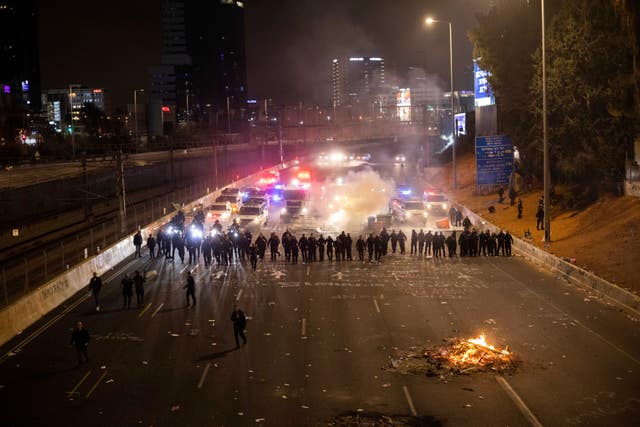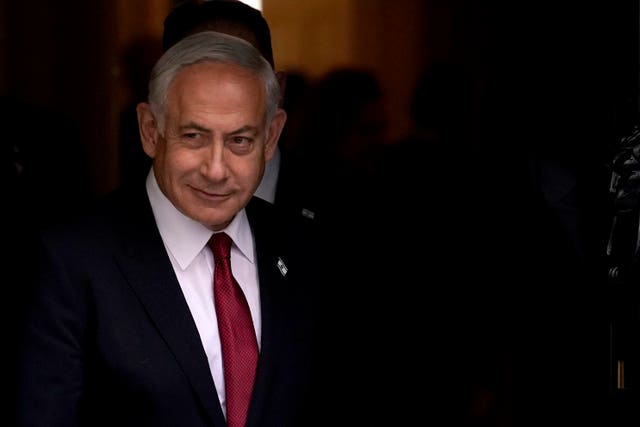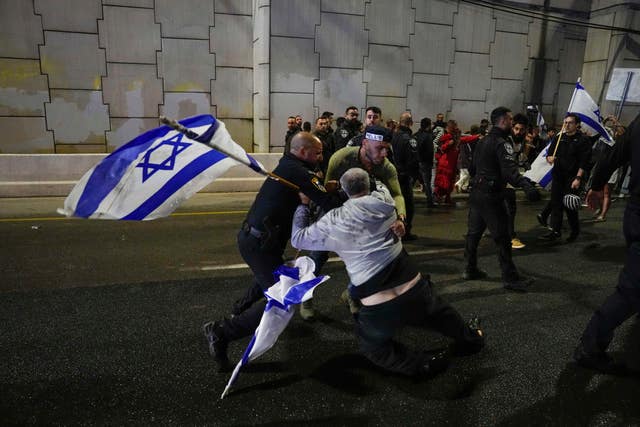Israel’s largest trade union group has launched a strike across a broad swathe of sectors, joining a surging protest movement against Prime Minister Benjamin Netanyahu’s plan to overhaul the judiciary – a plan that is facing unprecedented opposition.
The strike by the Histadrut umbrella group, which represents more than 700,000 workers in health, transit and banking, among many other fields, could paralyse large parts of Israel’s economy, which is already on shaky ground, ratcheting up the pressure on Mr Netanyahu to suspend the overhaul.
Israel’s Airports Authority has said departing flights from the country’s main international airport have been grounded following the launch of the strike.
The growing resistance to the plan came hours after tens of thousands of people burst into the streets around the country in a spontaneous show of anger at Mr Netanyahu’s decision to sack his defence minister after he called for a pause to the overhaul.
Chanting “the country is on fire”, they lit bonfires on Tel Aviv’s main motorway, closing the road and many others throughout the country for hours.

It has sparked a sustained and intensifying protest movement that has spread to nearly all sectors of society, including its military, where reservists have increasingly come out publicly to say they will not serve a country veering towards autocracy.
The crisis has further divided Israel, magnifying longstanding and intractable differences over the country’s character that have riven it since its establishment.
The protesters say they are fighting for the very soul of the nation, seeing the overhaul as a direct challenge to Israel’s democratic ideals.
The government has labelled them anarchists out to topple a democratically elected leadership.
The crisis has also shone a light on Mr Netanyahu himself, Israel’s longest serving leader, and the lengths to which he may be willing to go to maintain his grip on power, even as he battles the corruption charges.
The sacking of his defence minister at a time of heightened security threats in the West Bank and elsewhere appeared to be a last straw for many, prompting a new surge of opposition.
“Where are we leading our beloved Israel? To the abyss,” Arnon Bar-David, the union group head, said in a rousing speech to applause.

The group had sat out the months-long protests but the defence minister’s sacking appeared to provide the impetus for the drastic measure.
On Monday, as the embers of the motorway bonfires were being cleared, Israel’s ceremonial President Isaac Herzog urged Mr Netanyahu to immediately halt the overhaul, calling on the government to put aside political considerations for the sake of the nation.
“The entire nation is rapt with deep worry. Our security, economy, society – all are under threat,” he said. “Wake up now!”
Former prime minister Naftali Bennett, a former ally turned rival of Mr Netanyahu’s, said on Monday that Israel was “in a landslide of losing control”.
“We haven’t been in such a dangerous situation in 50 years,” he told Israeli Army Radio.
Universities across the country said they were shutting their doors “until further notice”.
Israeli media reported that a lawyer representing Mr Netanyahu in his corruption trial threatened to quit if the overhaul was not halted.

National Security Council spokesperson Adrienne Watson said the United States was “deeply concerned” by the developments in Israel, “which further underscore the urgent need for compromise”.
“Democratic values have always been, and must remain, a hallmark of the US-Israel relationship,” Ms Watson said in a statement.
Mr Netanyahu had reportedly spent the night in consultations and was set to speak later on Monday.
Israeli media said he would halt the legislation, which could not be independently confirmed.
Some members of Mr Netanyahu’s Likud party said they would support the prime minister if he did heed calls to halt the overhaul, but the architect of it, justice minister Yariv Lavin, a popular party member, has said he would resign.
Mr Netanyahu’s hardline allies pressed him to continue on.
“We must not halt the reform in the judicial system and we must not give in to anarchy,” national security minister Itamar Ben-Gvir said.
Mr Netanyahu’s dismissal of defence minister Yoav Gallant appeared to signal that the prime minister and his allies will barrel ahead this week with the overhaul plan and the committee moving the legislation forward was meeting as planned on Monday.

Mr Netanyahu’s government pledged to forge ahead with a parliamentary vote this week on a centerpiece of the overhaul – a law that would give the governing coalition the final say over all judicial appointments.
It also seeks to pass laws that would would grant parliament the authority to overturn Supreme Court decisions and limit judicial review of laws.
A separate overhaul law that would circumvent a Supreme Court ruling to allow a key coalition ally to serve as minister was being delayed following a request from that party’s leader.
Mr Netanyahu and his allies say the plan will restore a balance between the judicial and executive branches and rein in what they see as an interventionist court with liberal sympathies.
But critics say the laws will remove Israel’s system of checks and balances and concentrate power in the hands of the governing coalition.
They also say that Mr Netanyahu has a conflict of interest because of his corruption trial.

He denies wrongdoing and has dismissed accusations that the legal overhaul is designed to find him an escape route from the trial.
Mr Netanyahu returned to power late last year after a protracted political crisis that sent Israelis to the polls five times in less than four years.
The elections were all a referendum on Mr Netanyahu’s fitness to serve while on trial for corruption.






